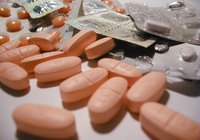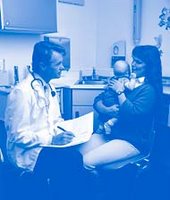 We’ve all been there -- broke and desperate for cash. These are the times when we actually read bulletin boards and local papers, scanning for ads offering easy money.
We’ve all been there -- broke and desperate for cash. These are the times when we actually read bulletin boards and local papers, scanning for ads offering easy money. Healthy volunteers needed for clinical trials. Will pay.
Hmm, tempting. But what could you be getting yourself into?
Six men in England are asking themselves just that. They volunteered to test a drug called TGN1412, designed to treat leukemia, multiple sclerosis and rheumatoid arthritis. The drug, which was developed by German pharmaceutical company TeGenero, had already been tested extensively in the laboratory and was not expected to elicit dangerous side effects in people -- but it left the six men fighting for their lives.
Doctors aren’t yet certain what the drug did to make them so sick, but they believe that it over-stimulated the men’s immune systems. When present in the body, TGN1412 binds to a molecule on the surface of special immune cells, prompting the body to make more of the cells. The drug may have caused the body to make so many of them that they essentially “went crazy,” turning on the body and attacking healthy body cells by mistake. It didn’t take long for the cells to do serious damage -- the men in the trial suffered from multiple organ failure and have been in the hospital for over a week.
TeGenero maintains that the drug showed no such effects in its animal tests on rabbits and monkeys, though apparently some monkeys did develop swollen glands. “In pre-clinical studies, TGN1412 has been shown to be safe and the reactions which occurred in these volunteers were completely unexpected,” says Dr. Thomas Hanke, TeGenero’s Chief Scientific Officer, in a prepared statement.
This is exactly why it’s important to consider the risks of participating in clinical trials before jumping in head first. It’s likely that a drug being clinically tested, especially in a phase I trial (drugs usually go through four trial phases), has never been administered to people before. And even if it has already been shown to be safe for animals, there’s no guarantee that it is also safe for people.
“Part of the problem is how predictive our animal models are. They’re not too bad, but they’re not perfect,” says Peter Smith, a senior vice president at Millennium Pharmaceuticals in Massachusetts, in an article appearing in the magazine Drug Discovery & Development last July.
Indeed, clinical trials exist to determine whether a drug is safe and effective for humans -- no one knows beforehand. In a clinical trial, participants are essentially guinea pigs.
An even if a drug is essentially “safe,” there can still be pretty unpleasant side effects associated with taking it, including nausea, headaches, hair loss, and skin irritation. Some drugs, like Merck’s Vioxx, may even squeeze through clinical trials despite evidence of more serious “side effects.” (Vioxx, which was sold to an estimated 20 million Americans before being withdrawn from the market, has been shown to cause heart attacks.)
Clinical trials are also complicated by the fact that drug safety is rarely a black-and-white issue. Safety and efficacy are often highly dependent on dosage – and it’s difficult to predict the correct dosage from pre-clinical tests. As a result, trials are often used to experiment with dosage, and even if a drug is safe in certain amounts, it’s possible for volunteers to be administered an incorrect and harmful amount. Although overdose risk is minimized by giving volunteers low doses to start with and gradually increasing them, dosage effects are not always predictable.
That said, drug companies try their best to ensure that drugs entering clinical trials are likely to be safe. A clinical trial is an expensive venture, so it’s in a company’s best interest to uncover potential safety issues before a trial begins. To this end, companies are constantly developing technologies and improving animal tests so as to weed out dangerous or useless drugs early on.
And, don’t get me wrong -- clinical trials are also a medical necessity. Without them, new life-saving drugs would never be uncovered and brought to market. Most participants do, of course, emerge healthy, and catastrophes like that with TGN1412 are a rarity. Trials can also offer sick people access to new experimental treatments that may help them.
The bottom line is that it is important to recognize and consider all aspects of participating in a clinical trial before doing so. There is a reason that these trials offer money -- if you participate, you’re accepting a risk to your health. No one can ensure your safety, and the doctors treating you won’t really know what you’re getting yourself into any more than you do. ☼
 Patients who were prayed for by strangers did not exhibit improved recovery after heart surgery, and patients who knew they were being prayed for actually had more post-surgery complications, according to research published yesterday.
Patients who were prayed for by strangers did not exhibit improved recovery after heart surgery, and patients who knew they were being prayed for actually had more post-surgery complications, according to research published yesterday. 













